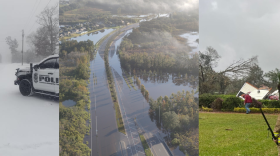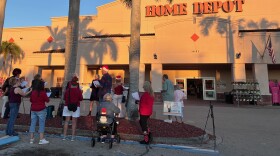Updated 9/21/2021 at 2:01 PM to include Collier County Sheriff's Office's response.
At a protest and rally last week, the Coalition of Immokalee Workers and other residents marked the one year anniversary of the police shooting death of Nicolas Morales Besanilla by repeating the three demands they’ve made over the past twelve months.
First, people here say they want justice.
“The killing of Nicolas Morales was a senseless thing that took place in our community of essential workers feeding the country. And what we need is support, not bullets," said Gerardo Reyes Chavez, a farmworker and an organizer with the Coalition of Immokalee Workers.
“We are here demanding that there is a reopening of the investigation, because we do not find the killing of a man who needed help in the middle of a mental health crisis to be killed as an acceptable response. And we cannot let this happen again,” Reyes-Chavez said.
The group also wants the Collier County Sheriff’s Office to improve its mental health crisis response capabilities, particularly in the farmworker community of Immokalee. Reyes-Chavez has picked tomatoes, oranges, watermelons, peppers and knows intimately the psychological stressors of existence as an essential worker with little voice.
“I mean you have to deal with the fact that sometimes you don’t have a job or your boss has stolen your payment, you end up homeless. Situations of violence in the fields, situations of stagnation of wages,” Reyes-Chavez said.
Giselle Ramirez Garcia grew up in Immokalee and is a member of the FGCU Student-Farmworker Alliance. She’s here at the protest hoping for a change in the way officers treat people in Immokalee whose mental health conditions are not the same as in other parts of the county.
“Immokalee has a long history of trauma," Ramirez-Garcia said. "There are people there that come from different parts of Latin America and the world, and they come from very dangerous places. And then you get here and the police and any other government official don’t make any effort to get to know the community, to try and understand how we are, our culture, our language. They just kind of push us aside.”
The group also wants to have a resident committee to aid in communication and understanding when violent officer-involved incidents happen.
WGCU asked the Collier County Sheriff’s Office to comment on the three demands of the protest group, and here is their unedited response to our query:
"1. a reopening of the investigation into officers' actions leading to Morales' death. A death investigation, an independent review by the State Attorney’s Office and an investigation by our Professional Responsibility Bureau all determined that the deputies’ actions were justifiable and were within both policy and the law.
2. a conversation about improving mental health crisis response in their community. Our deputies undergo Crisis Intervention Team training. The 40-hour training equips deputies with skills to de-escalate encounters with individuals in a mental health crisis. The training is provided to deputies in partnership with the National Alliance on Mental Illness of Collier County and the David Lawrence Centers. In 2016 CCSO was the first law enforcement agency in Florida to earn gold standard status from the Florida CIT Coalition for meeting and exceeding the Memphis Model Crisis Intervention Training core elements.
Sheriff Rambosk directed the establishment of a CCSO Mental Health Unit five years ago. The unit was among the first law enforcement mental health units in the nation. It is made up of deputies and mental health professionals with CCSO and the David Lawrence Centers. The unit aids individuals who are in behavioral crisis resulting from known or suspected mental illness of substance addiction.
We are also accepting applications for Crisis Call Diversion Counselors to work in our Communications Division as mental health triage dispatchers to divert mental-health-related calls by de-escalating the caller(s), assessing for risk, providing crisis intervention and referral to crisis, outpatient and community services as appropriate. A bachelor’s degree and a background in mental health resources are required. We encourage anyone interested to apply at colliersheriff.org/careers
Sheriff Rambosk, Mental Health Unit Lt. Leslie Weidenhammer and representatives from the David Lawrence Centers met in Immokalee with Coalition of Immokalee Workers representatives in June to discuss our mental health initiatives.
3. A citizen- led review board in Immokalee to investigate events concerning law enforcement interactions with residents of the community. Our Professional Responsibility Bureau works to ensure that our members throughout the county abide by agency values and maintain high standards of conduct and professionalism. Corrective measures are taken when members are found to be non-compliant with agency policy and procedures. All complaints submitted to PRB, including those that are submitted anonymously, are thoroughly investigated. We also have a Citizens’ Review Panel that is made up of seven citizens and five CCSO members. The panel reviews all closed Professional Responsibility Bureau investigations that involve allegations of unreasonable force. All panel meetings are open to the public.
We continue to have many partnerships in Immokalee to build and expand our relationships in the community. Earlier this year we partnered with the Immokalee Foundation to establish the Collier County Public Safety Career Academy. This academy provides participants with the 232 hours of training needed to earn state certification as 9-1-1 dispatchers. Several graduates have become CCSO members and are working in our Communications Division."








